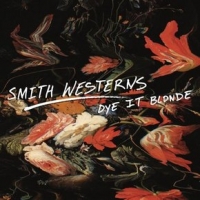Every Thursday, Pop Addict presents infectious tunes from contemporary musicians across indie rock, pop, folk, electronica, and more.
 Smith Westerns: Dye It Blonde (Fat Possum Records, 1/18/11)
Smith Westerns: Dye It Blonde (Fat Possum Records, 1/18/11)
Smith Westerns: “Weekend”
[audio:https://alarm-magazine.com/wp-content/uploads/2011/01/Weekend.mp3|titles=Smith Westerns: “Weekend”]Known primarily for its lo-fi blend of ’70s glam and Nuggets-era garage rock, Smith Westerns has discovered a sweeter, cleaner sound on Dye It Blonde, its sophomore LP on Fat Possum Records.
A hearty leap in production value is the most significant shift from the band’s 2009 self-titled debut. Gone are the fuzzy, washed-out melodies and underwater vocals of early recordings. Yet Dye It Blonde feels just as youthful and energetic as anything the band has released to date.
Though Smith Westerns has largely abandoned the murky, homespun sound that ignited the blogosphere only two years ago, fans of the band need not worry – Dye It Blonde is filled with jangly guitar hooks and young heartbreak. With the help of producer Chris Coady and an increased studio budget, however, Smith Westerns delves even further into the Brit-pop canon, culling inspiration from the likes of Suede, David Bowie, and T. Rex.
Without a single member of the band over the age of 21, the record brims with youthful enthusiasm. Look no further than album opener and lead single “Weekend” for evidence that the move from the basement to the studio has yet to quell the band’s charm. The track’s starry, warbled keys waft behind familiar, albeit much cleaner, guitar hooks and a pop-infused rhythm section. The candy-coated vocals, in which guitarist Cullen Omori sings “Weekends are never fun / unless you’re around here too” cue an album replete with cuteness, longing, and heartbreak. The entire record, it seems, is a teenage quest to find someone to dance with.
The closing leg of “All Die Young” only echoes this hopeful sincerity, with Omori’s sweet refrain, “Love is lovely when you are young.” The song highlights a sizable cross-section of keys — complete with organ, piano, and synths — and proves to be a more mature, but still fun, departure from earlier work. By the final Broadway-style sing-along, the track evolves into something surprisingly epic, an earnest nod to the musical antics of Marc Bolan or Bowie.
Many times, when a young band makes its first trek into the studio, the resultant album’s energy can feel dampened or bogged down by all the bells and whistles of professional recording. The 10 tracks on Dye It Blonde, however, giddily embrace the tools afforded them, while still harnessing the rawness and innocence of those very first songs, recorded in Max Kakacek’s basement so many years ago — way back in 2009.

